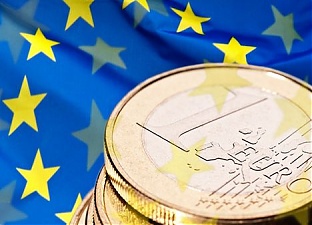
All rights reserved.
You may not copy, reproduce, republish, or otherwise use www.baltic-course.com content
in any way except for your own personal, non-commercial use.
Any other use of content requires the hyperlink to www.baltic-course.com.

Printed: 06.07.2025.
 PrintEuropean economy through the Semester and reforms
PrintEuropean economy through the Semester and reforms
The Commission is of the opinion that European economy has come out of recession and, according to Eurostat latest forecast, it maintains the course of a moderate recovery. Thus, e.g. employment and domestic demand have been gradually improving, although investment has grown at a slower pace compared to past recoveries. The strengthening of domestic demand and gradually reduced reliance on external demand supported the economy’s resilience.
Small though stable growth
 |
|---|
Winter Economic Forecast is showing 1.9% growth for the EU-28 and 1.7% growth for the 19-euro area states. The EU economic policies have helped to restart the economy; besides, the recovery is being supported by external factors. Among such policy’s lines are monetary conditions (which are set to remain highly accommodative) and fiscal policy (which is also considered to be broadly neutral); according to ECB’s assessment, such policy is even “slightly expansionary”.
Vice-President Dombrovskis stressed that recovery remained fragile and therefore there were more reasons for concern than a few months ago. Thus, e.g. external environment has deteriorated and the member states have seen an increase in financial market volatility and in risk aversion. Therefore, the states have to remain vigilant and continuously reassess the economic situation.
Most of all, the states need to implement policies that support macroeconomic stability and confidence. This includes efforts in some EU countries to address issues of high public and private debt and high external debt.
Recent improvements on the employment and social side in the states have shown a slight reduction in the disparities among the EU states in key social and labour market indicators (the annual country reports will be published at the end of February). The reports are showing that some member states have been tackling structural shortcomings, but the pace is uneven: the reforms are slowing down as market pressure has eased.
A number of EU states still need to carry out genuine reforms in many areas to unlock Europe's growth potential and be better prepared for new challenges and risks. Therefore economic policy coordination at the EU level gives coherence and continuity to the member states’ actions. In this regard, Vice-President noticed that policy directions should not be driven by market sentiment alone, but by a sense of what is good for both the member states and for citizens.
European Semester process
For the Commission, the European Semester process is the key vehicle to focus Member States' attention on their most important challenges. Gradually, the European Semester takes a more central role, also in domestic policy debates on fiscal and macroeconomic challenges.
However, the progress in implementing country-specific recommendations is mixed, despite the fact that these recommendations go through a very thorough adoption process: recommendations proposed by the Commission are carefully screened by both the Council of Ministers and the European Council. It is also important that these recommendations are approved at the national level.
In this regard, the role of the European Parliament and national parliaments is crucial: thus national parliaments “need to evolve” argued Vice-President, to become more intensively and more regularly involved in the national decision-making process and national practices.
The Commission has already held detailed discussions with national parliaments, social partners and other “actors”.
EU economic strategy for 2016
The Commission has put growth, convergence and stability at the heart of the EU’s economic policy. There are three main policy priorities, endorsed by the European Council: = reviving investment; = pursuing structural reforms to boost productivity and competitiveness; and = ensuring sustainable public finances.
It means that the member states’ measures have to be well-designed, properly legislated and effectively implemented, which requires an adequate institutional and administrative capacity. In order to support the member states in this respect, the Commission proposed a comprehensive European Structural Reform Support Programme with a dedicated budget.
Any EU state would be able to benefit from support based on best international practices although tailor-made to the circumstances in individual countries. The proposal is presently discussed in the European Parliament; it is expected that the EP will grant its support in time for the Programme to start in 2017.
Euro area policies
In line with the Five Presidents' Report on Completing the Economic and Monetary Union, the Commission has made the euro area policies more prominent. Thus, for the first time, the euro area recommendations are published at the beginning of the European Semester, i.e. in November together with the Annual Growth Survey (rather than at the end, as used to be in previous practice).
This new timing has opened up the possibility for a more lively debate than in the past and, according to Commission, will also ensure that common euro area concerns are fully reflected in May-cycle in the country-specific recommendations for euro area states.
The five recommendations for the euro area highlight the need for further structural reforms, sound public finances, measures to address macroeconomic imbalances, reduce private and public debt, while deepening EMU.
There is, of course, overlap between the challenges and policy needs of the euro area and those of all EU-28 states. The need to restore convergence is, however, particularly acute in the euro area, argued Vice-President. He added that there have been some challenges that needed joint response by the 19-euro area, which included common efforts towards stronger Economic and Monetary Union.
Shortly after the 5 Presidents' Report (June 2015), the Commission put forward proposals on practical implementation of all the initiatives with a balanced and realistic approach on how best to move forward.
Vice-President concluded that the common task of improving economic and social conditions should be based on “best performers”. The member states need to reform their economic and social structures to keep them competitive in the European/global economy, to be prepared for any future shocks and to preserve cohesive societies.
Reference: http://europa.eu/rapid/press-release_SPEECH-16-328_en.htm?locale=en.